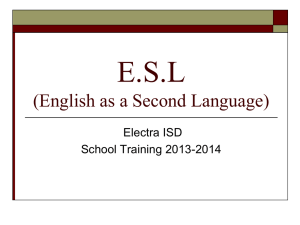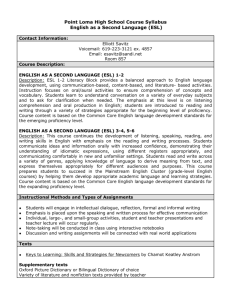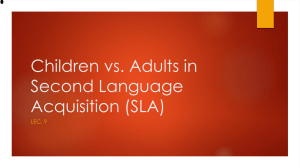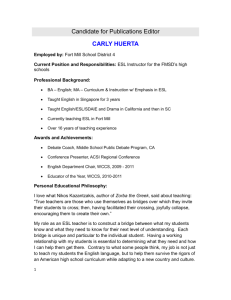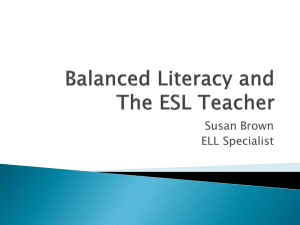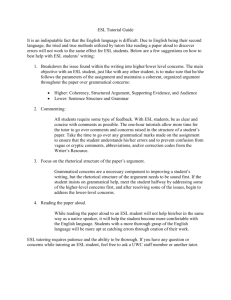EGL 262 Methods of Teaching 3 3 0
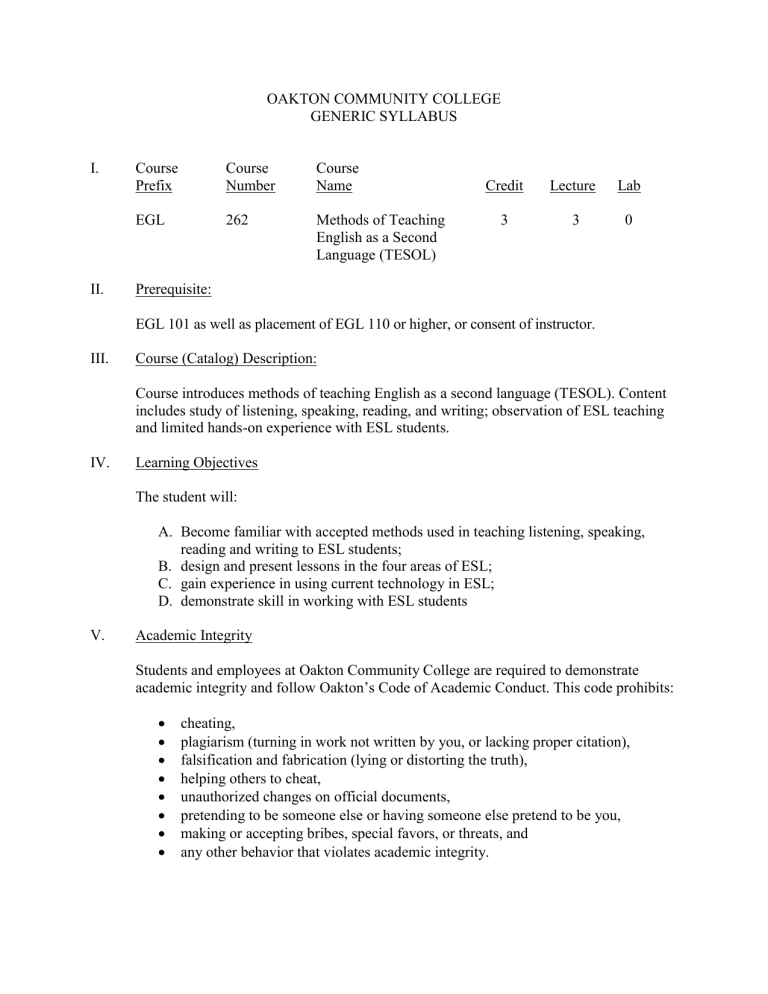
OAKTON COMMUNITY COLLEGE
GENERIC SYLLABUS
I. Course
Prefix
EGL
Course
Number
262
Course
Name
Methods of Teaching
English as a Second
Language (TESOL)
Credit Lecture Lab
3 3 0
II. Prerequisite:
EGL 101 as well as placement of EGL 110 or higher, or consent of instructor.
III.
Course (Catalog) Description:
Course introduces methods of teaching English as a second language (TESOL). Content includes study of listening, speaking, reading, and writing; observation of ESL teaching and limited hands-on experience with ESL students.
IV.
Learning Objectives
The student will:
A.
Become familiar with accepted methods used in teaching listening, speaking, reading and writing to ESL students;
B.
design and present lessons in the four areas of ESL;
C.
gain experience in using current technology in ESL;
D.
demonstrate skill in working with ESL students
V.
Academic Integrity
Students and employees at Oakton Community College are required to demonstrate academic integrity and follow Oakton’s Code of Academic Conduct. This code prohibits:
cheating,
plagiarism (turning in work not written by you, or lacking proper citation),
falsification and fabrication (lying or distorting the truth),
helping others to cheat,
unauthorized changes on official documents,
pretending to be someone else or having someone else pretend to be you,
making or accepting bribes, special favors, or threats, and
any other behavior that violates academic integrity.
Generic Course Syllabus
EGL 262
Page 2
There are serious consequences to violations of the academic integrity policy. Oakton’s policies and procedures provide students a fair hearing if a complaint is made against you. If you are found to have violated the policy, the minimum penalty is failure on the assignment and, a disciplinary record will be established and kept on file in the office of the Vice President for Student Affairs for a period of 3 years.
Details of the Code of Academic Conduct can be found in the Student Handbook.
VI.
Sequence of Topics
A.
Overview of History of ESL Methodology
B.
Methods of Teaching Listening Comprehension
C.
Methods of Teaching Speaking
1.
Oral Communication
2.
Pronunciation and Suprasegmentals
D.
Methods of Teaching Reading
E.
Methods of Teaching Writing
1.
Grammatical Structures
2.
Rhetorical Patterns
F.
Technology in Teaching ESL
G.
Teaching Culture
H.
Special Issues of Teaching ESL
1.
Special Education and ESL
2.
Generation 1.5 and ESL
3.
Issues of Literacy and ESL
4.
Assessment and ESL
5.
Cooperative Learning and ESL
6.
Multiple Intelligences and ESL
VII.
Methods of Instruction
Course may be taught as a face-to-face, media-based, hybrid, or online course.
Lecture, discussion, small group work, class observations, service learning
VIII.
Course Practices Required
Reading, writing, in-class exercises, homework, testing, projects, presentations, developing sample lessons, at least two observations of ESL teaching situations, and four or more sessions of supervised work with ESL students. Students will complete 10-15 pages of written work, including essays, assignments, papers, and reports on classroom observations and sessions working with ESL students and sample lessons.
IX.
Instructional Materials
Note: Current textbook information for each course and section is available on Oakton’s
Schedule of Classes.
D:\726954024.doc
Generic Course Syllabus
EGL 262
Page 3
Suggested Text: Teaching by Principles: An Interactive Approach to Language Pedagogy
2 nd Ed. H. Douglas Brown. Burlingame, CA: Alta Vista, 2001.
See chairperson or coordinator for other titles.
X.
Methods of Evaluating Student Progress
Writing assignments, homework, tests and quizzes, essays, projects, presentations, reports of classroom observations, sample lesson plans and lessons, assessment of performance in working with ESL students, attendance and participation
XI.
Other Course Information
Attendance Policy
For whatever information/procedures the instructor holds the student accountable.
If you have a documented learning, psychological, or physical disability you may be entitled to reasonable academic accommodations or services. To request accommodations or services, contact the Access and Disability Resource Center at the
Des Plaines or Skokie campus. All students are expected to fulfill essential course requirements. The College will not waive any essential skill or requirement of a course or degree program.
Ending term: Effective beginning term: Fall 2013
Syllabus prepared by: Virginia Gibbons
Revised by:
Reviewed by Chair: Lynn Woodbury
Approval by Dean: Linda A. Korbel
Date: September 25, 2001
Date:
Date: March 2006
Date: June 2013
D:\726954024.doc

